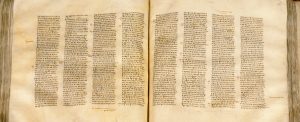Feast of the Forefathers of Christ — Colossians 3:4-11; Luke 14:16-24
Glory to God the Father, the Son, and the Holy Spirit. Amen.
Today’s Gospel parable is appointed for the second Sunday before Christmas.
If we put this parable back into its setting in the Gospel (put the text back into its context), then we might get an insight into the parable that we won’t find by just reading today’s verses alone. So, immediately before our parable:
[Jesus] said also to the man who had invited him, “When you give a dinner or a banquet, do not invite your friends or your brothers or your kinsmen or rich neighbors, lest they also invite you in return, and you be repaid. But when you give a feast, invite the poor, the maimed, the lame, the blind, and you will be blessed, because they cannot repay you. You will be repaid at the resurrection of the just.” When one of those who sat at table with him heard this, he said to him, “Blessed is he who shall eat bread in the kingdom of God!” (Luke 14:7-15).
The Lord begins by describing the love of God. If you want your love to be heavenly, then you have to love more than merely moral or generous people do. Mutual gift exchanges and being good to those who are good to you are both positive and right behaviors, but they don’t rise to the level of God’s love. In this life God blesses the unjust and sinners the same as He does the righteous, pouring out air, sunshine, and rain on everyone.
He is saying that if you feed people who are in need and could never repay you, then you are making the Kingdom present here and now for these people. They don’t need to wait until some distant future Kingdom comes – you can make the Kingdom present right now for them.
Hearing Christ’s teaching, someone sitting at the table with Jesus exclaims about the blessedness of anyone who is invited to the heavenly banquet in the age to come: “Blessed is he who shall eat bread in the kingdom of God!”
Today’s parable doesn’t stop here, though. What if, instead of joining your meal, your invited guests reject your hospitality? Not only do they not let you give to them – they show contempt for your hospitality. They show complete disdain for your generosity.
In this parable, the host chooses to ignore the insult from his honored guests, and instead shares the banquet with people who have never shown any generosity towards the host, people who can’t repay his hospitality. He turns the banquet into a feast of the Kingdom by inviting in people he has never cared about before. By throwing open the doors, he has turned his failed banquet into a heavenly banquet.
* * *
Now to complete the context — Immediately after this parable, we read:
Now the tax collectors and sinners were all drawing near to hear him. And the Pharisees and the scribes murmured, saying, “This man receives sinners and eats with them.” (Luke 15:1-2)
When the Lord embraces everyone who comes to him, welcoming them to his table, it turns out everyone can stand the scandalous hospitality of the Master.
The Lord’s parable has the originally invited guests all making the most insulting excuses for why they won’t attend the banquet with the celebration offered to them. Nobody buys a field he has never even looked at. Any newlywed who has just married a wife is already at his own marriage feast and honeymoon, not scrolling through his email, responding to invitations.
We’ve read this passage today to remind us now, in the Nativity season, that salvation is a gift – and it is possible to reject this gift. “How shall we escape, if we neglect so great salvation?” (Hebrews 2:3)
Saint Gregory Palamas writes:
In church today, however, we celebrate the forefathers, most of whom were Hebrews by race. For what reason? So that all of us may learn that the Hebrews were not disinherited, nor were the nations adopted as sons, in a way that was unjust, unreasonable or unworthy of God who did these things and made these changes.
Rather, just as among those nations who were called, only the obedient were chosen for kinship with God, so the race of Israel, and Adam’s descendants down to Israel’s time, were a great multitude, but only those among them who lived according to God’s will were true Israelites. To these the prophecies belonged; through these, future events were prefigured; and to these the promises were given (cf. Romans 3:1–4:13). Only these people were the true fathers and forefathers – firstly forefathers of her who in virginity gave birth to Christ who is God over all (Romans 9:5), according to the flesh; and then, through Him, our own forefathers.
So this parable is given to us as a sobering wake-up call. It puts before us the reality that the Kingdom of God is open to all who will enter. And our part is to receive the invitation and enter in.
Saint Paul describes to the Church in Rome how the blessing of God on Abraham’s seed has never gone away, even if many of Abraham’s descendants do not receive him in the flesh.
I am speaking to you Gentiles. Inasmuch as I am the apostle to the nations, I take pride in my ministry in the hope that I may somehow arouse my own people to envy and save some of them. For if their rejection brought reconciliation to the world, what will their acceptance be but life from the dead? If the part of the dough offered as firstfruits is holy, then the whole batch of dough is holy; if the root is holy, so are the branches. If some of the branches have been broken off, and you, though a wild olive shoot, have been grafted in among the others and now share in the nourishing sap from the tree’s root, do not consider yourself to be superior to those other branches. If you do, consider this: You do not support the root, but the root supports you. You will say then, “Branches were broken off so that I could be grafted in.” Granted. But they were broken off because of unbelief, and you stand by faith. Do not be arrogant, but tremble. For if God did not spare the natural branches, he will not spare you either. Consider therefore the kindness and sternness of God: sternness to those who fell, but kindness to you, provided that you continue in his kindness. Otherwise, you also will be cut off. And if they do not persist in unbelief, they will be grafted in, for God is able to graft them in again (Romans 11:13-23).
Lest our focus wander, the point of today’s parable is not to build a theology of how other people may be broken off from Christ and grafted in, or who is invited to the Kingdom feast, and who has refused.
The Church has chosen to put this reading today, just before the feast of the Nativity, is to provoke us to respond to the invitation we have received – to become that good and faithful servant who enters into the joy of the Lord (Matthew 25:23).
Saint Herman of Alaska said, “For our good and for our happiness, let us all make a vow: at least from this day, this hour, this very minute, we should strive to love God above all else and do His will!”
The table is set, the fatted calf is ready, and you have an invitation to enter in and sit in the household of God, dine at his banquet, and be sons and daughters of his Kingdom. “Blessed is he who shall eat bread in the kingdom of God!” (Luke 14:15). May none of us turn back, even if we stumble every step of the way.
And in Revelation, at the end of all things, we read:
Then I heard what seemed to be the voice of a great multitude, like the roar of many waters and like the sound of mighty peals of thunder, crying out, “Alleluia! For the Lord our God the Almighty reigns. Let us rejoice and be glad, and give him glory, for the marriage of the Lamb has come, and his Bride has made herself ready; it was granted her to clothe herself with fine linen, bright and pure” – for the fine linen is the righteous deeds of the saints. And the angel said to me, “Write this: Blessed are those who are invited to the marriage supper of the Lamb.” And he said to me, “These are the true words of God” (Revelation 19:6-9).
To the glory of God the Father, the Son, and the Holy Spirit. Amen.






